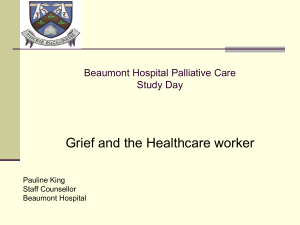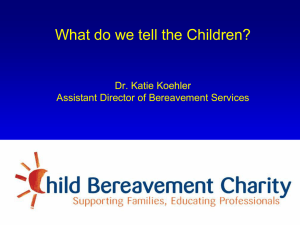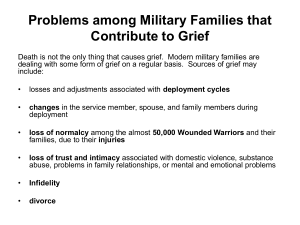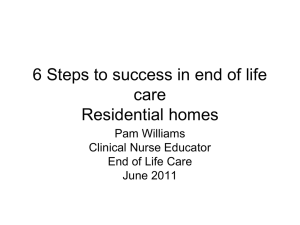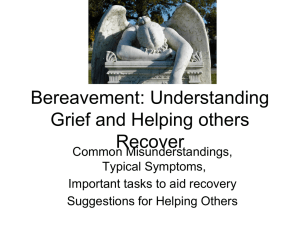files/Grief In The Workplace Presentation
advertisement
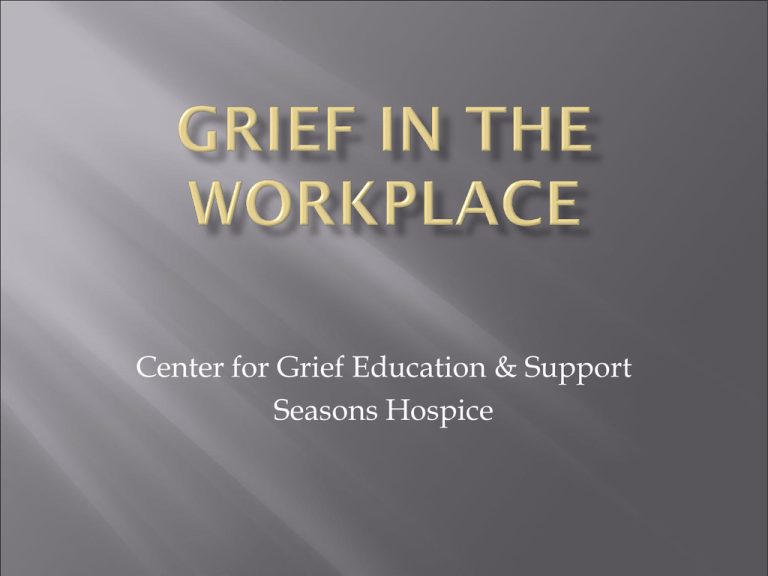
Center for Grief Education & Support Seasons Hospice Death of a Loved One $37.5 billion Family Crisis $ 9.02 billion Death of a Close Friend, Colleague, or Extended Family $7.04 billion Pet Loss $2.4 billion Major Lifestyle Alterations $2.4 billion The Grief Recovery Institute Educational Foundation, Inc. -- 2003 We live in a “grief denying” culture Grief is taboo, closeted subject Pain and suffering are not acceptable states of being, and so are avoided and/or “treated” Society is secularized; decrease in reliance on a religious framework to cope with loss and grief, decrease in rituals and community support “Blessed are those who grieve quickly and efficiently for they meet the criteria for managed care.” Minimize the grief Shame Avoid Cliches Bereavement Grief Mourning Bereavement is the objective event of loss. A relationship with someone or something that is valued A loss occurs A feeling of deprivation occurs Loss is always personal. No one can decide what constitutes a loss to another person. Significant Relationships Possessions Self Developmental History of Loss Birth Today __________________________/________________________ Grief is the reaction to loss Natural, internal response to loss Universal, dynamic, invisible, genderless, ageless, non-linear, cumulative and endless Experienced physically, mentally, emotionally, socially, and spiritually Involves a continual process of adjustment Physical Indigestion, headaches, sleep disturbance Mental Short-term memory loss, confusion Emotional Mood swings, short fuse, guilt Social Isolation Spiritual Anger at God, “Why” questions Mourning is the processes of coping with grief External expression of grief Defined by beliefs, attitudes, traditions, culture, religion, gender, age Influenced by the relationship with the person or object, mode of loss, previous loss experience, personality and social variables, and concurrent stressors Unique, visible process Roles that a loved one fulfilled in one’s life Roles that one specifically fulfilled in a loved one’s life Personal role changes Relationship role changes Everyday life Experience Loss-Oriented Grief work Restorationoriented Attention to life changes Focus on past Focusing on future Processing the primary loss Processing the secondary loss Accepting the reality of the loss Adjusting to a different environment Working through the pain of grief Relocating your loss in your life A loss is one of the most difficult situations faced by employees, co-workers and the workplace. NHPCO It’s about How you Live At Work Physical Issues: Absenteeism, lack of motivation Mental Issues: Inability to concentrate, errors, confusion, accidents Emotional Issues: Mood swings, “grief attacks” Social: Isolation, substance use on the job Spiritual: Resentful Decrease in productivity Decrease in morale Decrease in safety Loss of employee Re-training of new personnel Increased staff load Significant financial cost to business Critical Incidence Response Program Bereavement related policies and programs Resources, counseling, and educational materials Classes and workshops for staff Sensitivity training for managers and supervisors Eldercare Services/Consultation Cathy has worked as an administrative assistant for five years. Her colleagues describe her as dedicated and “invaluable.” For the past two years, she helped her grandfather care for her grandmother, who had Alzheimer’s disease. Cathy helped her grandfather coordinate her grandmother’s care and drove him to the nursing home every evening so he could spend time with his wife. Cathy’s grandmother recently died. Cathy is very worried about her grandfather. NHPCO It’s about How you Live At Work How could this affect your business? Absenteeism Workday interruptions Reduced productivity Supervisor time Unpaid leave Replace position Co-workers NHPCO It’s about How you Live At Work How much could she cost your business? (if her salary is $15.00/hour and there is no workplace support) $1888.90 www.eldercalculator.org NHPCO It’s about How you Live At Work Be fired as a result of reduced productivity or frequent absences Alienate her co-workers who pitch in to help cover her workload Become resentful if her employers aren’t sympathetic Quit her job NHPCO It’s About How You LIVE At Work LIVE! NHPCO It’s About How You LIVE At Work Work-life program models Policies and benefits Community resources NHPCO It’s About How You LIVE At Work New and/or fine tune existing: Work-Life programs Policies Benefits Manager resources Employee resources NHPCO It’s About How You LIVE At Work Existing and new work-life programs, policies and resources available: To Employees Staff Meetings Company newsletter New employee orientation To Community Local newspaper or magazine articles NHPCO It’s About How You LIVE At Work Managers: to monitor grief issues Employees: to ask for help Co-workers: to support co-worker in need Other businesses: to educate employees Community: to improve care for the grieving NHPCO It’s About How You LIVE At Work Increased employee morale and loyalty Retention of good employees Family-friendly work environment Decreased cost to business It’s the right thing to do! NHPCO It’s About How You LIVE At Work Consultation regarding work-life policies and procedures Management training related to handling loss and grief issues at work while balancing the need for performance and productivity with the needs of the bereaved employee. Employee presentations, workshops, and/or seminars on loss and grief with focus on understanding bereavement, grief, and mourning through the life-span, helping others who are mourning, and other topics. On-site consultation and/or interventions following significant losses in an employee’s life. Employee referrals for counseling, support groups and other community resources.
